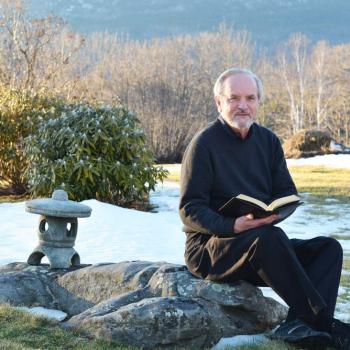Note: This article is part of a special Patheos Symposium, Passing on the Faith: Teaching the Next Generation. Read more perspectives here.
So much of religious education is abstract—stories, beliefs, ideas about how life works. Meanwhile youth long for experience. They long to do something. If we could listen to the restless yearning hidden within the hearts of the young, we might hear something like, "No more talk of love. No more tales of suffering. No more cautionary fables. Give me someone to kiss. Give me a road to walk. Give me ashes to grieve. Help me make my own regrets." This kind of raw desire is troubling to parents and manipulated by advertisers, and yet it's exactly this honest ache for life and relationship that Christian communities should cultivate and address.
What my children want from religious communities are opportunities for the direct exploration of real living. They don't want to talk about God, they want to live God. They don't want to hear about great deeds, they want to be asked to do great deeds. For religious communities to aid the spiritual growth of young people in the future, they need to find ways to encourage, bless, train, and support young people in the active pursuit of real life. It is in that pursuit that God is discovered.
The youth of this age carry the same hurt and prayer and visions and spiritual ache that all of us harbored when we were young. They long to fall in love. They long to discover and pursue and develop their own gifts. They long to be overcome by the Great Mystery we call "God." They long to be seen and known, accepted and celebrated by people with warm hearts. Although the culture shifts and technologies invade, the desires of children and youth remain the same.
The challenge for me, and the struggle for those called to tend the spiritual essence of children and adolescents, is to remember what we know—remember what is needed. Young people are looking for living people who take the soul's desires seriously. They are looking for people who care about what matters; people struggling to pursue loving relationships (with God, others, enemies, self); people willing to struggle for freedom and healing; people willing to risk new forms of living that resist the frantic, isolating, and violent culture that surrounds us.
In my town children and youth are looking for people with mischief in their eyes, people willing to say "yes" to the active pursuit of love. Four examples of what this might look like from my own town, none of which were initiated by local youth ministries:
Overwhelmed with worry and sadness following the 2010 earthquake in Haiti, a group of local adults invited eight Haitian middle and high school students (as well as other interested students) to spend a weekend exploring a Christian approach to suffering. Thirty students signed up. For two days we experimented with various practices that heal suffering (silence, prayer, singing, art, storytelling, solitude). The final night the kids held a prayer vigil that lasted into the wee hours of the morning.
For over twenty years two members from my church have volunteered with Witness for Peace, accompanying families and communities in Nicaragua and Honduras who face persecution. On one trip they invited youth and families with children to join them. Two youth from our community and three families participated. These trips continue.
Upset by the loss of salmon in our local rivers, a college woman in town began an art project to raise awareness and funds to help the salmon. A church member invited this young woman to speak about her project in worship. At the end of her presentation the speaker invited the children and youth of the church to help her create the public art protest. Twenty teens and children signed up and the church created youth and children classes to help prepare them understand and prepare for the event.
A former theater teacher in our church asked a local teenage girl if she might write a play for a church Christmas pageant. She did and the teacher helped her put it on. On the night of auditions, a woman in our church brought in a young teenage boy whom she had heard singing around her neighborhood. The boy became the primary singer in the play. The show (with a hard hitting message on the suffering of military families) was a hit and the boy now sings regularly at church and community events.
What real activities can churches and religious teachers do with youth and children? How can we help the children and youth of our town live out the faith first, and then learn the theology and beliefs second? It begins with people listening to the yearnings and needs of the young and then prayerfully, imaginatively, and even courageously responding.
8/1/2013 4:00:00 AM




